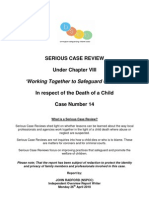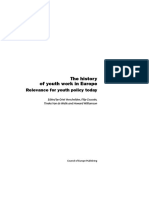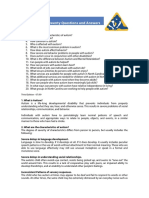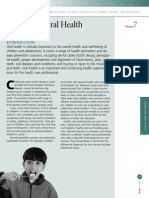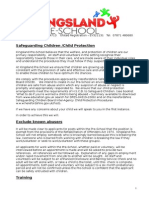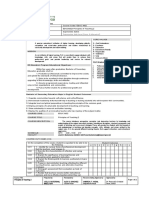Child Protection Awareness in Education - Module 4
Uploaded by
Zubair AhmedChild Protection Awareness in Education - Module 4
Uploaded by
Zubair AhmedChild Protection Awareness in Education
Child Protection Awareness in Education Working Together
nation-specific information, see the Signposts at the end of this module. Acting within this framework of law and guidance, local agencies agree more detailed ways of working together. This is done through child protection committees (CPCs) in Scotland and local safeguarding children boards (LSCBs) in England and Wales. There is also a new Safeguarding Board for Northern Ireland (SBNI) being established. They develop local policies and procedures that apply to everyone working with children, including schools and FE colleges. G their health is likely to be significantly impaired, or further impaired, without the provision of services G they are disabled and, in Scotland, their parents are disabled. If the local authority believes that a child may be in need they can carry out an assessment (usually with the agreement of the parents) to identify the support and help required. This assessment covers: G the child's developmental needs G the capacity of the parent(s) or carer(s) to respond to the child's developmental needs, including the need to keep the child safe from harm G the impact of wider family and environmental factors. Schools have an important contribution to make to this assessment, particularly in relation to the assessment of the childs educational, emotional and behavioural development. Some children in need will also be experiencing abuse. Local authorities have a specific duty to carry out
Legal framework Welcome to the last The main legal framework is provided module in the NSPCC by the Children Act 1989 in England and Wales, the Children (Scotland) EduCare learning Act 1995 and the Children (Northern programme. In the Ireland) Order 1995. These brought together the laws relating to children previous module, you and families and established clear learned what to do, requirements for the protection of children. either when a child has confided in you, or when This legislation is supported by which sets out how agencies you have concerns about guidance, and individuals should work together to a child who has not promote childrens welfare and protect approached you. We also them from abuse and neglect. For covered what happens Key definitions and duties after you have reported The legislation states that it is the duty of every local authority to safeguard and your concerns. promote the welfare of children within
In this module we will help you place your actions in a wider context by introducing you to the law and government guidance which covers this area of work. We will also explore how organisations and individuals should work together to safeguard children. their area who are in need. A child is in need if: G they are unlikely to achieve or maintain a reasonable standard of health or development without the provision of services
G If any child leaves the school without warning, check out what is happening and report any concerns. G Have a school policy and measures to prevent bullying (a requirement). G Have guidelines that minimise the opportunities for abuse. G Develop counselling services so that children have someone to talk to.
Allegations against staff
Wherever there are children there is a possibility that a member of staff or a volunteer may use their position and relationship with a child to abuse them. Schools can take steps to help prevent this. These include: enquiries if they receive reports that a child is suffering or is likely to suffer significant harm. They must also take any steps that are necessary to safeguard these children. Childrens social services can ask for assistance from schools and FE colleges when they conduct an enquiry. Pointers to good practice G Provide training on child protection for everyone who works in the school, including volunteers, and for school governors when they join and at least every three years. G Ensure that school governors are aware of their statutory responsibilities for safeguarding children. G Create an ethos and culture that values, involves and listens to children. G Help children understand what is and is not acceptable behaviour towards them and how to speak up if they have worries. G Build good working relationships with parents and other agencies. G Use the curriculum to develop childrens awareness of staying safe. G keeping to a minimum occasions when adults are alone and unobserved with children G being vigilant in recruiting paid staff and volunteers this includes being rigorous in taking up references G following current legal requirements, such as criminal record checks G having a code of conduct and guidelines on appropriate physical contact and restraint G ensuring all staff are aware of the procedures for handling allegations against staff. Occasionally, people who pose no risk to children are accused of child abuse. A child may misinterpret an innocent action as abusive, perhaps because of a previous experience of abuse. Some children are desperate and confused and may accuse someone to draw
Working together
To keep children safe from significant harm, individuals and organisations have to work together, since social workers cant safeguard children on their own. Government guidance says that all agencies and professionals should: G be alert to potential indicators of abuse or neglect G be alert to the risks which individual abusers, or potential abusers, may pose to children G share and help analyse information so that an informed assessment can be made of the childs needs and circumstances G contribute to whatever actions are needed to safeguard the child and promote their welfare G work co-operatively with parents unless this may compromise the childs safety.
Your schools responsibilities
Weve already said how important the role of the school is in safeguarding children. Each school must have a designated member of staff with responsibility for safeguarding children and a policy committing staff to following local procedures if they have concerns about a childs safety or welfare. So what else can a school do to prevent children suffering as a result of abuse?
Child Protection Awareness in Education Working Together
attention to other problems they are having. Whatever you may believe, you should take seriously what a child says and never let allegations against a member of staff go unreported, including any made against you or your colleagues. You should write a record of what has been said and report what you have heard as soon as possible, according to your school or colleges policy. Childrens social services will decide whether a child protection investigation into the allegation is required. If it seems that a crime has been committed the police will decide whether to carry out a criminal investigation. The employer may also begin disciplinary proceedings. Allegations should be dealt with promptly and in a way that is
fair to both the child and the member of staff. Arrangements should be in place locally to support affected staff and to co-ordinate the necessary action.
And finally
You have now completed a basic training programme in child protection awareness. You have learned what abuse is, the different types of abuse and the effects that abuse can have on a child. You have also learned about possible signs of abuse and how to respond if a child confides in you. You understand what to do if a child has talked to you about abuse or if you have concerns without the child having confided in you. You know what will happen after you have reported your concerns and the different roles and responsibilities of all concerned.
Signposts
If you want to learn more about legislation, guidance, policy, research and practice on safeguarding children and young people in schools, FE colleges and other education settings in England, Wales, Northern Ireland and Scotland, visit: www.nspcc.org.uk/cpae for signposts to key documents and websites. You may also be interested in NSPCC inform: the online child protection resource The UKs only free, online, specialised child protection resource for practitioners, researchers, trainers, policy-makers and other professionals working to protect children www.nspcc.org.uk/Inform NSPCC EduCare If you would like to further your learning these NSPCC EduCare programmes are suitable for people working in education settings: Preventing bullying behaviour (four modules) Childrens rights (four modules) Someone to turn to (21 modules) www.nspcc.org.uk/EduCare Other NSPCC resources Safety in learning: safeguarding training for the education community Suitable for induction and refresher child protection training in schools and further education colleges www.nspcc.org.uk/sil Childrens voices: living with parental substance misuse Video material for use in training people who work with children identify and respond to the needs of children living with parents who misuse substances www.nspcc.org.uk/seehear Core-info Leaflets about physical injuries to children for people who work with children featuring key research findings and implications for good practice www.nspcc.org.uk/core-info For details about other child protection learning resources, visit: www.nspcc.org.uk/learningresources
The information in this module was current in January 2009. No part of this material may be reproduced or utilised in any form or by any means, electronic or mechanical, including photocopying, recording or by any information storage and retrieval system without permission in writing by the NSPCC and de Brus Marketing Services Ltd (trading as EduCare). Whilst the NSPCC and de Brus Marketing Services Ltd (trading as EduCare) have made every effort to ensure that the programmes and their content have been devised and written by leading experts who have ensured that they reflect best practice in all aspects, the NSPCC and de Brus Marketing Services Ltd exclude their liability of the consequences of any errors, omission or incorrect statements to the fullest extent permitted by law and the NSPCC and de Brus Marketing Services Ltd make no warranty or representation as to the accuracy, completeness or fitness for purpose of any statements or other content in the programme.
de Brus Marketing Services Ltd (trading as EduCare) CPE11M04 - 01/09
Photographs posed by models Registered charity numbers: 216401 and SC037717
NSPCC 2009
You might also like
- Warhammer 40,000 - Codex Army Lists (1993)100% (17)Warhammer 40,000 - Codex Army Lists (1993)24 pages
- Rochdale Safeguarding Children Board Serious Case Review - 1No ratings yetRochdale Safeguarding Children Board Serious Case Review - 1160 pages
- Chapter 10 Curriculum Standards and TestingNo ratings yetChapter 10 Curriculum Standards and Testing26 pages
- People of The Philippines vs. Oanis and GalantaNo ratings yetPeople of The Philippines vs. Oanis and Galanta2 pages
- 2016 Whole School Child Protection Policy and Templates Revised Nov 2016No ratings yet2016 Whole School Child Protection Policy and Templates Revised Nov 201682 pages
- A Contemporary Model of Residential Care For Children and Young People in Care 2010No ratings yetA Contemporary Model of Residential Care For Children and Young People in Care 201096 pages
- SCI - POL - Child Safeguarding Policy (Updated) - ENG100% (1)SCI - POL - Child Safeguarding Policy (Updated) - ENG10 pages
- Child and Adult Safeguarding Policy Revd June 2018No ratings yetChild and Adult Safeguarding Policy Revd June 201815 pages
- ViolenceAgainstChildren by SOS Children VillagesNo ratings yetViolenceAgainstChildren by SOS Children Villages44 pages
- Early Childhood Development Policy ReviewNo ratings yetEarly Childhood Development Policy Review41 pages
- Fact Sheet - Promoting Mental Wellbeing For All VictoriansNo ratings yetFact Sheet - Promoting Mental Wellbeing For All Victorians7 pages
- Using Food and Nutrition Information To Plan A Healthy Diet With Bibliography0% (1)Using Food and Nutrition Information To Plan A Healthy Diet With Bibliography10 pages
- FINAL SPS INTERNAL Procedural Guide 4.1.15No ratings yetFINAL SPS INTERNAL Procedural Guide 4.1.15199 pages
- 2.4 - Types of Early Childhood EducationNo ratings yet2.4 - Types of Early Childhood Education4 pages
- Techniques and Guidelines For Social Work Practice, 7/ENo ratings yetTechniques and Guidelines For Social Work Practice, 7/E71 pages
- Do Learning Stories Tell The Whole Story of Children S Learning A Phenomenographic EnquiryNo ratings yetDo Learning Stories Tell The Whole Story of Children S Learning A Phenomenographic Enquiry14 pages
- The Need For Guidance and Counselling inNo ratings yetThe Need For Guidance and Counselling in12 pages
- Graduated Approach Guidance For: Early YearsNo ratings yetGraduated Approach Guidance For: Early Years34 pages
- Electronic Devices Before Bed Destroy Healthy Sleep CyclesNo ratings yetElectronic Devices Before Bed Destroy Healthy Sleep Cycles1 page
- Report Developing Global Guidelines For Children With Cerebral PalsyNo ratings yetReport Developing Global Guidelines For Children With Cerebral Palsy27 pages
- Autism Primer: Twenty Questions and AnswersNo ratings yetAutism Primer: Twenty Questions and Answers10 pages
- How Guided Play Promotes Early Childhood LearningNo ratings yetHow Guided Play Promotes Early Childhood Learning4 pages
- UNIT 8 LAB Childcare Facility Training Video Mariam Salhien100% (1)UNIT 8 LAB Childcare Facility Training Video Mariam Salhien11 pages
- Influence of Parenting Styles On Adolescent Delinquency in Delta Central Senatorial DistrictNo ratings yetInfluence of Parenting Styles On Adolescent Delinquency in Delta Central Senatorial District29 pages
- Ensuring A Positive Practice Environment: Occupational Safety For Health Worker ProductivityNo ratings yetEnsuring A Positive Practice Environment: Occupational Safety For Health Worker Productivity8 pages
- Social-Emotional Loneliness and Life SatisfactionNo ratings yetSocial-Emotional Loneliness and Life Satisfaction5 pages
- 02.2015martin Wedell Planning For Educational ChangeNo ratings yet02.2015martin Wedell Planning For Educational Change194 pages
- Supporting People With Sensory Loss Guide For Social Service Professionals EnglishNo ratings yetSupporting People With Sensory Loss Guide For Social Service Professionals English12 pages
- CACHE L2 Student Book Unit2 Sections4-5 Routines and TransitionsNo ratings yetCACHE L2 Student Book Unit2 Sections4-5 Routines and Transitions44 pages
- The Mindful Parent: Nurturing Your Child's Emotional IntelligenceFrom EverandThe Mindful Parent: Nurturing Your Child's Emotional IntelligenceNo ratings yet
- Well-Child Care in Infancy: Promoting Readiness for LifeFrom EverandWell-Child Care in Infancy: Promoting Readiness for LifeNo ratings yet
- I. Title:: Obtain Work Instruction in Accordance With Standard Operating ProceduresNo ratings yetI. Title:: Obtain Work Instruction in Accordance With Standard Operating Procedures3 pages
- Himachal Pradesh University NAAC Accredited 'A' Grade University Grade CardNo ratings yetHimachal Pradesh University NAAC Accredited 'A' Grade University Grade Card2 pages
- Technical Account Manager or Support Delivery Manager or AccountNo ratings yetTechnical Account Manager or Support Delivery Manager or Account2 pages
- Adapted From Several of Kevin Harris' Speeches Circa April, 2017No ratings yetAdapted From Several of Kevin Harris' Speeches Circa April, 20175 pages
- Assignment HBEC2203 (May 2018) - Farhana Part 1 & 2 MergeNo ratings yetAssignment HBEC2203 (May 2018) - Farhana Part 1 & 2 Merge10 pages
- Differentiated Instruction in Relation To Pupils' Learning StyleNo ratings yetDifferentiated Instruction in Relation To Pupils' Learning Style15 pages
- Insights On Lean Gamifications For Higher EducationNo ratings yetInsights On Lean Gamifications For Higher Education18 pages
- Application Fees - Ucl Master ApplicationNo ratings yetApplication Fees - Ucl Master Application2 pages
- Incels and The Manosphere Tracking Mens Movements OnlineNo ratings yetIncels and The Manosphere Tracking Mens Movements Online94 pages
- Accessible Transportation and Mobility: S. LING SUEN, Transportation Development Centre, Transport CanadaNo ratings yetAccessible Transportation and Mobility: S. LING SUEN, Transportation Development Centre, Transport Canada25 pages
- New York City Capital Commitment Plan FY 2010 Vol 3No ratings yetNew York City Capital Commitment Plan FY 2010 Vol 3723 pages
- Rochdale Safeguarding Children Board Serious Case Review - 1Rochdale Safeguarding Children Board Serious Case Review - 1
- 2016 Whole School Child Protection Policy and Templates Revised Nov 20162016 Whole School Child Protection Policy and Templates Revised Nov 2016
- A Contemporary Model of Residential Care For Children and Young People in Care 2010A Contemporary Model of Residential Care For Children and Young People in Care 2010
- SCI - POL - Child Safeguarding Policy (Updated) - ENGSCI - POL - Child Safeguarding Policy (Updated) - ENG
- Child and Adult Safeguarding Policy Revd June 2018Child and Adult Safeguarding Policy Revd June 2018
- Fact Sheet - Promoting Mental Wellbeing For All VictoriansFact Sheet - Promoting Mental Wellbeing For All Victorians
- Using Food and Nutrition Information To Plan A Healthy Diet With BibliographyUsing Food and Nutrition Information To Plan A Healthy Diet With Bibliography
- Techniques and Guidelines For Social Work Practice, 7/ETechniques and Guidelines For Social Work Practice, 7/E
- Do Learning Stories Tell The Whole Story of Children S Learning A Phenomenographic EnquiryDo Learning Stories Tell The Whole Story of Children S Learning A Phenomenographic Enquiry
- Electronic Devices Before Bed Destroy Healthy Sleep CyclesElectronic Devices Before Bed Destroy Healthy Sleep Cycles
- Report Developing Global Guidelines For Children With Cerebral PalsyReport Developing Global Guidelines For Children With Cerebral Palsy
- UNIT 8 LAB Childcare Facility Training Video Mariam SalhienUNIT 8 LAB Childcare Facility Training Video Mariam Salhien
- Influence of Parenting Styles On Adolescent Delinquency in Delta Central Senatorial DistrictInfluence of Parenting Styles On Adolescent Delinquency in Delta Central Senatorial District
- Ensuring A Positive Practice Environment: Occupational Safety For Health Worker ProductivityEnsuring A Positive Practice Environment: Occupational Safety For Health Worker Productivity
- 02.2015martin Wedell Planning For Educational Change02.2015martin Wedell Planning For Educational Change
- Supporting People With Sensory Loss Guide For Social Service Professionals EnglishSupporting People With Sensory Loss Guide For Social Service Professionals English
- CACHE L2 Student Book Unit2 Sections4-5 Routines and TransitionsCACHE L2 Student Book Unit2 Sections4-5 Routines and Transitions
- The Mindful Parent: Nurturing Your Child's Emotional IntelligenceFrom EverandThe Mindful Parent: Nurturing Your Child's Emotional Intelligence
- Well-Child Care in Infancy: Promoting Readiness for LifeFrom EverandWell-Child Care in Infancy: Promoting Readiness for Life
- I. Title:: Obtain Work Instruction in Accordance With Standard Operating ProceduresI. Title:: Obtain Work Instruction in Accordance With Standard Operating Procedures
- Himachal Pradesh University NAAC Accredited 'A' Grade University Grade CardHimachal Pradesh University NAAC Accredited 'A' Grade University Grade Card
- Technical Account Manager or Support Delivery Manager or AccountTechnical Account Manager or Support Delivery Manager or Account
- Adapted From Several of Kevin Harris' Speeches Circa April, 2017Adapted From Several of Kevin Harris' Speeches Circa April, 2017
- Assignment HBEC2203 (May 2018) - Farhana Part 1 & 2 MergeAssignment HBEC2203 (May 2018) - Farhana Part 1 & 2 Merge
- Differentiated Instruction in Relation To Pupils' Learning StyleDifferentiated Instruction in Relation To Pupils' Learning Style
- Insights On Lean Gamifications For Higher EducationInsights On Lean Gamifications For Higher Education
- Incels and The Manosphere Tracking Mens Movements OnlineIncels and The Manosphere Tracking Mens Movements Online
- Accessible Transportation and Mobility: S. LING SUEN, Transportation Development Centre, Transport CanadaAccessible Transportation and Mobility: S. LING SUEN, Transportation Development Centre, Transport Canada
- New York City Capital Commitment Plan FY 2010 Vol 3New York City Capital Commitment Plan FY 2010 Vol 3




